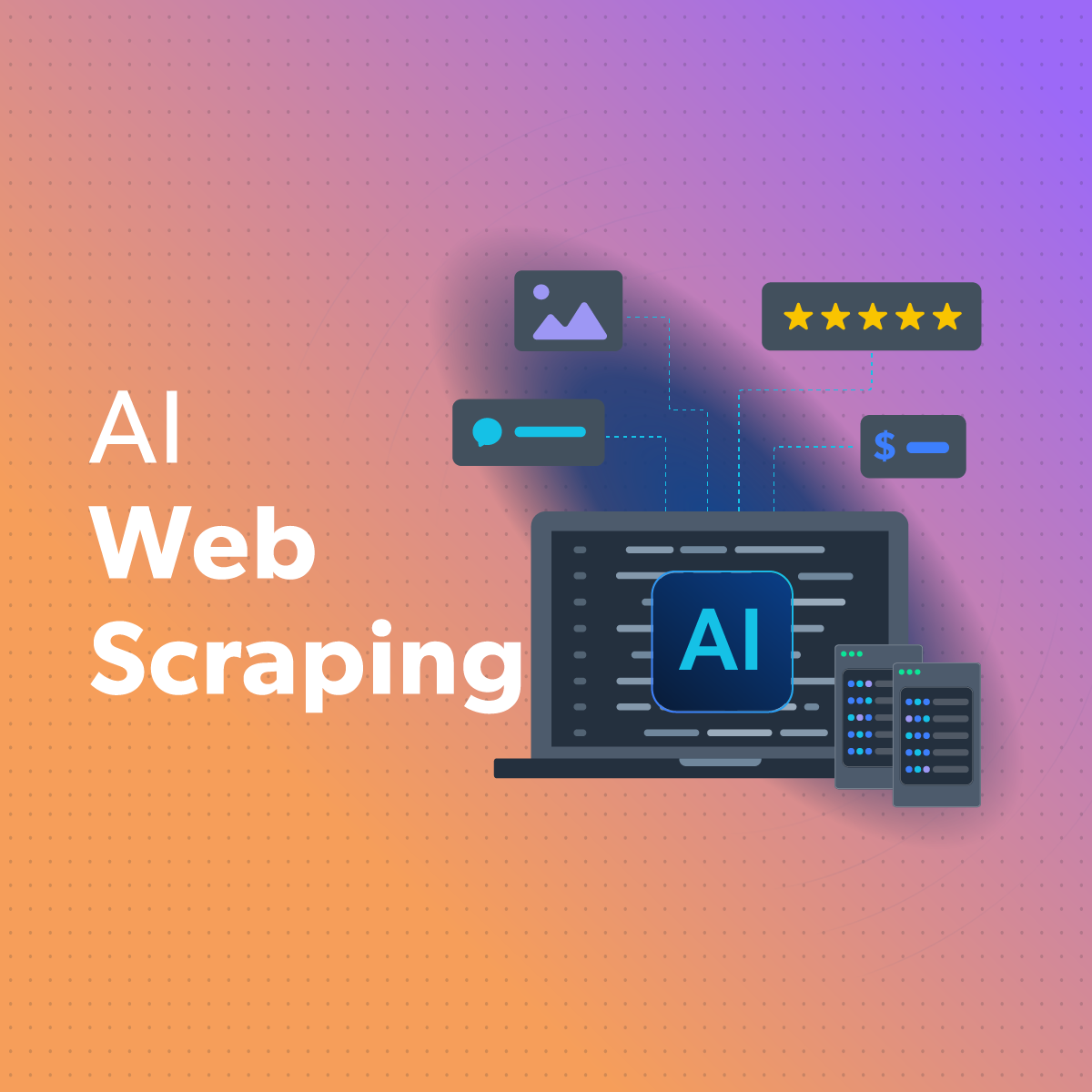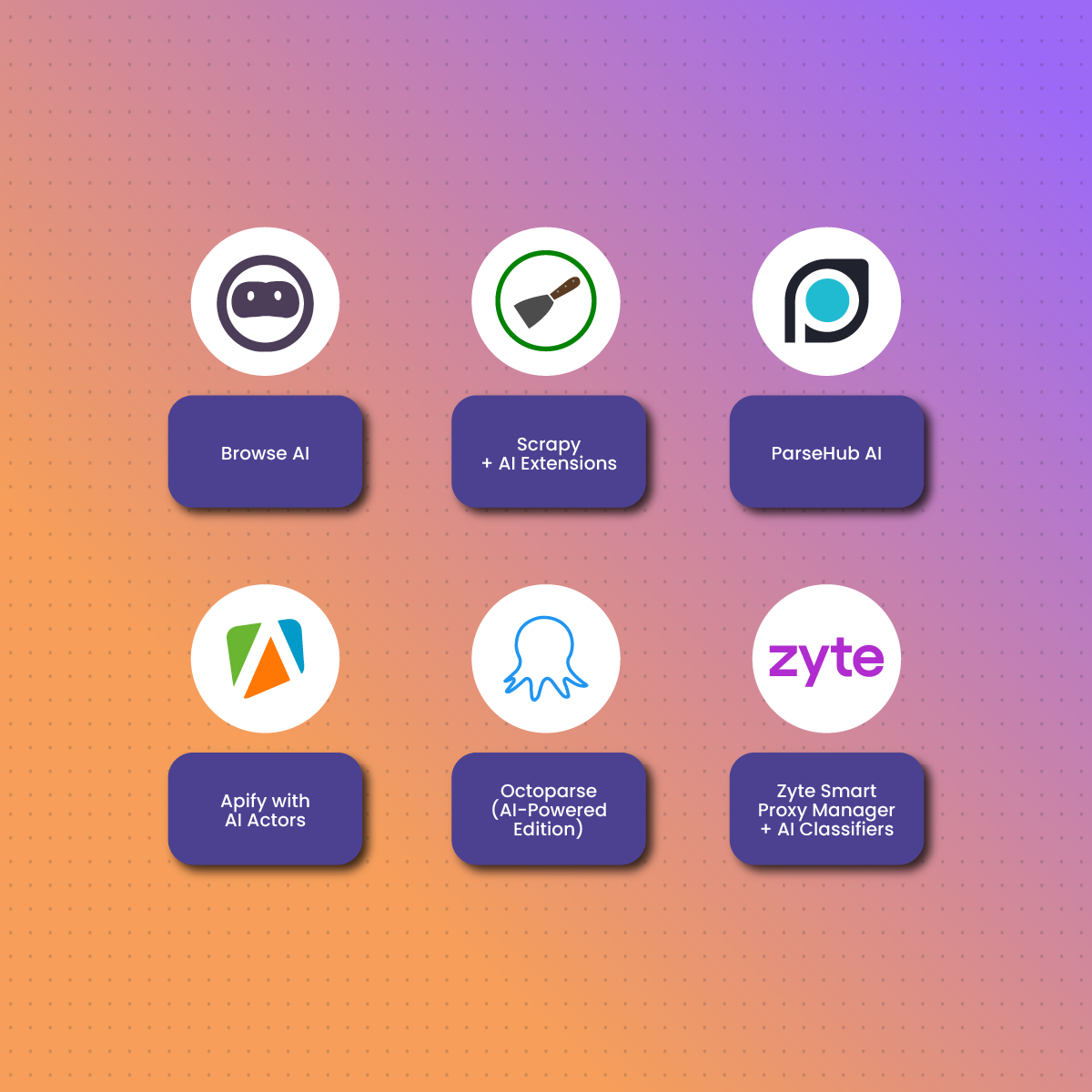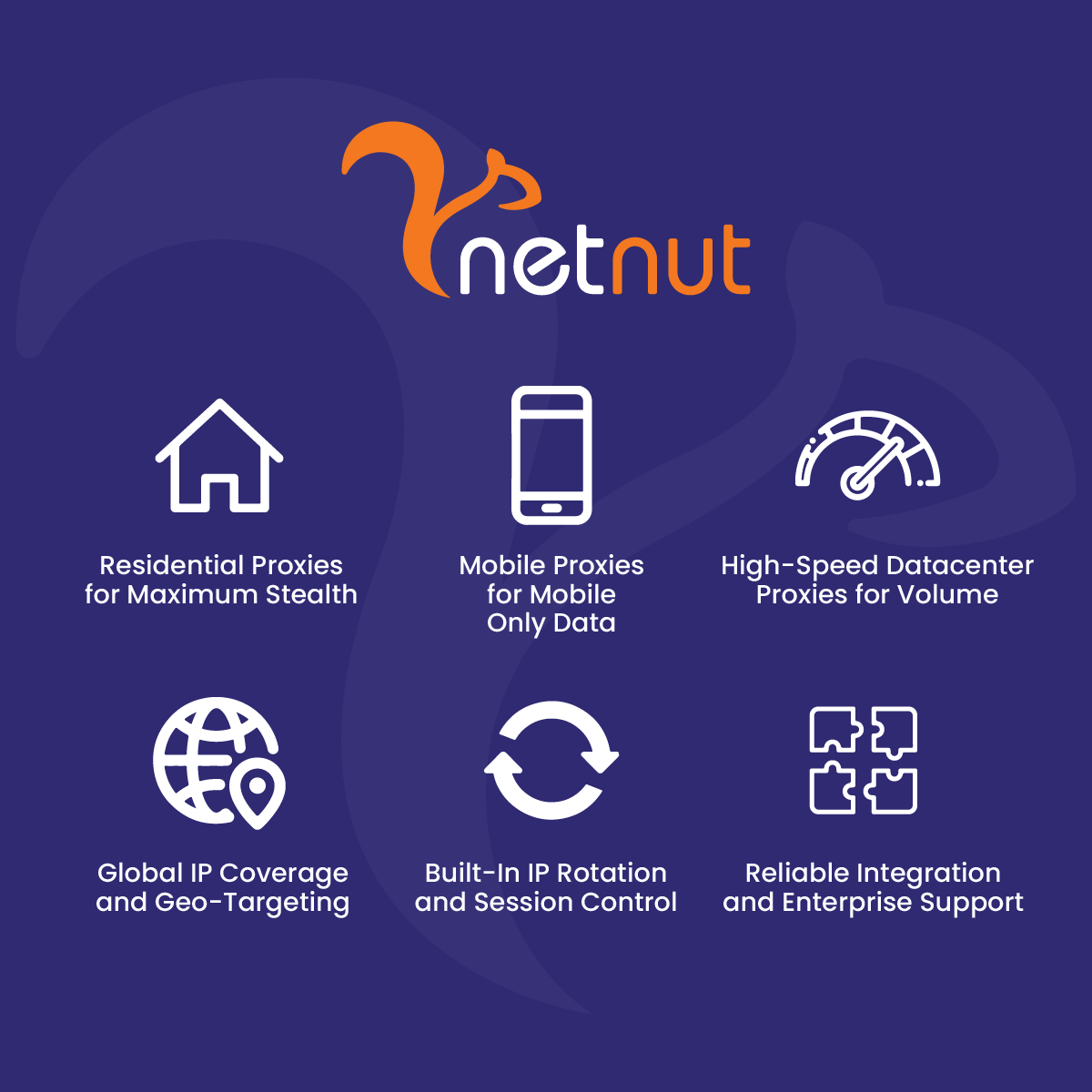The field of web scraping is evolving rapidly, and in 2025, we’re seeing a major shift driven by artificial intelligence. Traditional scraping tools—once reliant on static scripts and manual configuration—are being replaced or enhanced by AI-powered web scraping tools that can adapt to dynamic websites, extract structured data from unstructured sources, and even learn how to scrape new websites autonomously.
This transformation is fueled by advancements in machine learning, computer vision, and natural language processing (NLP), enabling tools to intelligently interpret and extract data from even the most complex web environments. From e-commerce price tracking to training datasets for LLMs, businesses are increasingly relying on AI-based data scraping to fuel innovation, gain competitive insights, and scale operations.
But scraping smarter doesn’t mean scraping alone. To truly unlock the potential of these AI scraping tools, teams need powerful, undetectable proxy infrastructure to support scalable and ethical data acquisition. That’s where NetNut comes in—providing residential, datacenter, and mobile proxies that integrate seamlessly with AI scraping solutions for global access, higher success rates, and reduced risk of bans.
In this guide, we’ll break down what makes AI web scraping tools different, what features to look for, and which tools are leading the market in 2025. Plus, we’ll show you how NetNut’s proxy solutions can supercharge your AI-powered data scraping workflows.
What Is AI-Based Web Scraping?
AI-based web scraping is the next generation of automated data extraction. Unlike traditional scrapers that rely on hardcoded selectors and static scripts, AI web scraping tools use advanced technologies like machine learning, NLP, and computer vision to dynamically understand, adapt, and extract data from complex and changing websites.
Here’s what makes AI web scraping different:
- NLP for Unstructured Content: AI tools can analyze and extract meaning from paragraphs, comments, reviews, and forum discussions—content that would be difficult to structure manually.
- Computer Vision for Visual Data: Some websites rely heavily on visual elements or render data through JavaScript. AI-based scrapers can “see” and extract data from these layouts, like a human would.
- Machine Learning for Structural Adaptation: AI scrapers can detect changes in page layout or structure and adjust extraction rules in real-time, reducing the need for constant manual updates.
- Entity Recognition and Data Classification: AI can categorize data during extraction—identifying products, prices, names, locations, and more—without needing post-processing.
These capabilities open up powerful new use cases for AI data scraping, including:
- Real-time market and price monitoring
- Sentiment analysis across forums and social media
- Content aggregation and news tracking
- LLM training data collection
- Competitor research and product intelligence
However, even the smartest AI scraper is only as effective as the infrastructure supporting it. Without reliable access to websites, your data pipeline breaks. That’s why leading AI teams pair their scraping tools with NetNut’s premium proxy network, ensuring stable, undetectable access to content across the globe—even from sites with the strictest anti-bot defenses.
Key Features to Look for in AI Scraping Tools
Not all AI scraping tools are created equal. As the market evolves in 2025, the best platforms combine intelligence, scalability, and ease of integration. Whether you’re building a custom data pipeline or looking for a ready-to-use scraping service, here are the key features to look for in a high-quality AI web scraping tool:
1. Smart Data Extraction
The tool should be able to handle unstructured and semi-structured content, understanding page context through NLP and pattern recognition. This is especially important for scraping data from forums, reviews, and other content-rich sites.
2. Visual Interpretation & Dynamic Page Support
Many modern websites use JavaScript-heavy, dynamic content. AI scrapers should be able to render pages (like headless browsers do) and extract data from visually complex interfaces using computer vision or DOM-learning models.
3. Auto-Adaptation to Site Changes
Web layouts change frequently, which can break static scraping scripts. AI tools should include machine learning algorithms that detect changes in structure and automatically adjust data extraction rules.
4. Built-In Anti-Bot Handling
The best AI scrapers can detect and bypass common anti-bot measures like CAPTCHAs, honeypots, rate limits, and JavaScript challenges. However, this usually requires integration with high-quality proxies, like those from NetNut, to avoid IP bans and detection.
5. Data Labeling & Classification
Advanced tools go beyond just extraction—they help label and classify data on the fly, often using built-in AI models. This saves time in post-processing and enables better downstream analysis or model training.
6. Scalable & Cloud-Based Architecture
AI scraping needs to scale. Look for tools that are cloud-native, support parallel processing, and offer API access for automation.
7. Proxy Integration Support
AI scraping tools should seamlessly integrate with proxy services. Whether for residential, datacenter, or mobile proxies, the tool must allow for custom IP rotation, geo-targeting, and concurrency management—all of which are easily handled through NetNut’s global proxy platform.
Best AI Web Scraping Tools in 2025
Let’s take a look at some of the leading AI-powered web scraping tools making waves in 2025. These platforms are selected based on their intelligence, reliability, ease of use, and proxy compatibility for seamless integration.
1. Browse AI
Browse AI is a point-and-click web scraping tool that uses machine learning to identify and extract data from web pages automatically. It’s perfect for non-developers and teams that want to automate scraping tasks without writing code.
- Visual site interaction and auto-scheduling
- Smart selectors and data classification
- Great for scraping tables, listings, and pricing data
- Integrates well with residential proxies like NetNut for undetectable access
2. Scrapy + AI Extensions
Scrapy is a powerful open-source framework, and in 2025, it’s frequently enhanced with LLM-based plugins and AI-driven selectors.
- Highly customizable Python framework
- Support for NLP modules and dynamic content rendering
- Ideal for developers building complex, large-scale pipelines
- Easily integrates with NetNut’s proxy APIs for scalability and stealth
3. ParseHub AI
ParseHub introduced new AI capabilities this year, allowing users to extract structured data from websites that were once too difficult to scrape.
- No-code interface with advanced visual scraping
- AI engines detect patterns and repeatable structures
- Good for scraping ecommerce, directories, and review platforms
- Works smoothly with proxy networks for bypassing detection
4. Apify with AI Actors
Apify’s marketplace now features AI-powered scraping actors, which use machine learning to scrape and structure data from thousands of websites.
- Serverless cloud execution and data pipeline integration
- Auto-scaling and parallel scraping across proxy pools
- Great for enterprise-grade LLM data collection and analysis
5. Octoparse (AI-Powered Edition)
Octoparse’s 2025 update includes new AI modules for content categorization, sentiment analysis, and adaptive scraping.
- Cloud-based, user-friendly UI
- Built-in CAPTCHA solving and structure recognition
- Supports NetNut’s residential and mobile proxies for real-time data extraction
6. Zyte Smart Proxy Manager + AI Classifiers
While Zyte is primarily known for its proxy infrastructure, its latest release includes AI classifiers for real-time content validation and quality filtering.
- Great for scraping high-value, structured data at scale
- AI modules detect low-value pages and block noise
- Works best when paired with a robust proxy service like NetNut for redundancy
Why Proxies Are Essential for AI Web Scraping
As powerful as AI scraping tools have become, they can only function at scale when supported by a robust, undetectable, and geographically flexible proxy infrastructure. In 2025, most websites have implemented advanced anti-bot defenses—from rate limiting and IP fingerprinting to CAPTCHAs and behavioral tracking. Without proxies, even the most intelligent scraper will be blocked or throttled.
Here’s why proxies are absolutely essential for AI-based data scraping:
1. Bypass IP Bans and Rate Limits
Scraping at volume from a single IP address is a guaranteed way to get blocked. Proxies distribute requests across multiple IPs, making it look like traffic is coming from many different users. With AI scrapers running hundreds or thousands of parallel tasks, this is non-negotiable.
2. Access Geo-Restricted Content
Websites often serve different content to users based on location. Whether you’re scraping for market research, ad intelligence, or training multilingual LLMs, using proxies with geo-targeting capabilities ensures you can see what real users see across the globe.
3. Improve Stability and Speed
By routing requests through high-performance proxy servers, AI scrapers enjoy faster page loads, fewer failures, and smoother automation, especially when paired with cloud-based scraping platforms.
4. Mimic Real User Behavior
Residential and mobile proxies, like those offered by NetNut, are tied to real devices and ISPs, making them virtually indistinguishable from actual users. This significantly reduces detection rates, especially on sites that deploy sophisticated anti-bot tech.
5. Enable Continuous, Scalable Scraping
AI data extraction pipelines often require around-the-clock uptime. Proxies enable uninterrupted access to data sources, and automated IP rotation ensures smooth operation even under heavy loads.
While many scraping tools offer built-in proxy options, the most effective setups use dedicated proxy services like NetNut, giving users full control over IP selection, session persistence, and location targeting.
How NetNut Supercharges AI Web Scraping
NetNut is more than just a proxy provider—it’s a scalable data access partner purpose-built for AI-driven organizations. Whether you’re scraping data for real-time decision-making, LLM training, or competitive intelligence, NetNut’s global proxy infrastructure ensures reliable and stealthy access to the web’s most valuable data sources.
Here’s how NetNut stands out in the AI web scraping landscape:
Residential Proxies for Maximum Stealth
NetNut’s residential proxies are sourced directly from real user devices via ISP connections, allowing for undetectable, high-trust scraping—perfect for sites that aggressively block datacenter traffic.
Mobile Proxies for Mobile-Only Data
Need access to mobile-optimized or app-only content? NetNut offers true mobile proxies from 3G/4G/5G networks—ideal for collecting mobile-first data, ad placements, and regional content variations.
High-Speed Datacenter Proxies for Volume
When you need speed at scale, NetNut’s dedicated datacenter proxies provide blazing-fast access with high concurrency, perfect for scraping static pages, search engines, or low-risk targets.
Global IP Coverage and Geo-Targeting
With millions of IPs across 150+ countries, NetNut gives you the geographic diversity needed for localized scraping, sentiment analysis, and geo-relevant AI training datasets.
Built-In IP Rotation and Session Control
NetNut offers intelligent IP rotation, enabling seamless scraping without manual intervention. You can control rotation rules, session persistence, and proxy pools to suit your scraping strategy.
Reliable Integration and Enterprise Support
NetNut’s proxies work with every major AI scraping tool—from Apify to Scrapy—and provide 24/7 technical support, usage analytics, and flexible API integration for enterprise-grade scraping workflows.
In short, NetNut removes the roadblocks between your AI scraping tools and the open web—giving your team the scale, reliability, and stealth needed to scrape smarter in 2025.
Final Thoughts on AI Web Scraping Tools
AI-powered web scraping is no longer a futuristic concept—it’s the standard in 2025. From intelligent data extraction and structure recognition to real-time content categorization, today’s AI scraping tools are smarter, faster, and more adaptable than ever before. But even the most advanced AI tool is only as effective as the infrastructure that supports it.
To truly maximize the value of these tools, you need more than just automation—you need reliable, scalable, and undetectable access to the global web. That’s where NetNut’s premium proxy solutions make the difference. Whether you’re running thousands of parallel scraping tasks or gathering training data for the next generation of LLMs, NetNut provides the speed, stability, and stealth required to operate at scale.
By pairing your favorite AI web scraping tool—like Browse AI, Apify, Scrapy, or Octoparse—with NetNut’s residential, mobile, or datacenter proxies, you’ll unlock higher success rates, broader content access, and more efficient data pipelines.









